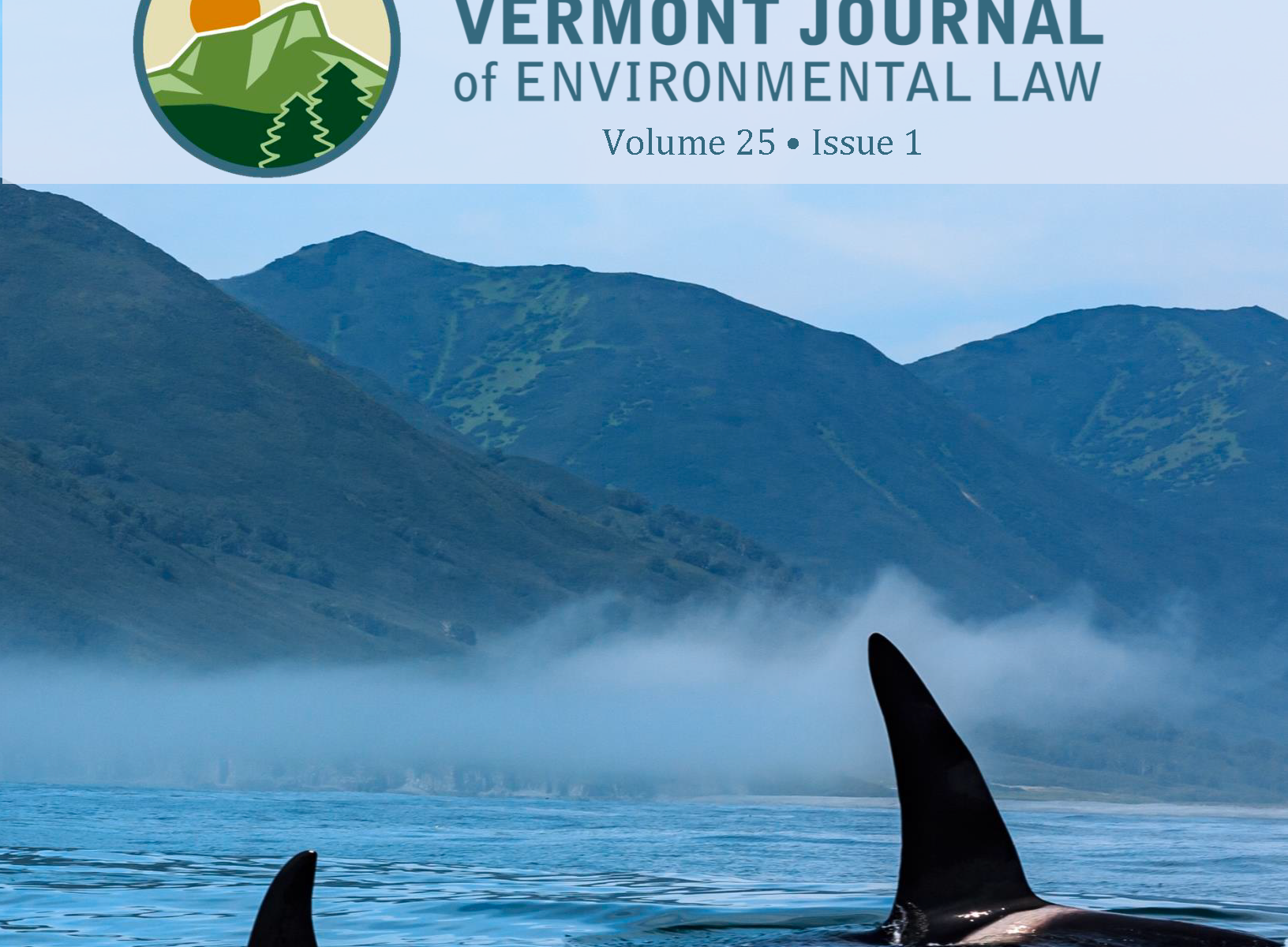
VJEL Newsroom
Published: Volume 25, Issue 1 of the Vermont Journal of Environmental Law
By VJEL
November 8, 2023
The Vermont Journal of Environmental Law (VJEL) is pleased to announce the publication of Volume 25, Issue 1. Issue 1 features two Articles and two Student Notes, ranging from concerns of fast fashion and its contribution to microplastics in the environment; international self-determination in the context of climate change; risk communication using the East Palestine train wreck as a case study; and the captivity of orcas. VJEL publishes exclusively online, and this Issue may be accessed on our website by clicking this link to view our Volume 25, Issue 1 Publication or accessing our Volume 25 Publications from the navigation header.
Articles:
By Emma Ross
What if your clothing is leaving little trails of plastic everywhere it has been? Emma Ross examines the regulation of the global fast fashion supply chain with respect to the accumulation of microplastics in the environment.
She surveys the existing legal framework, concluding that it is entirely insufficient for addressing fashion retailers’ contributions to microplastics pollution. We may focus on the packaging that our clothing comes in, but what about the pollution that comes from our clothes themselves? Ross gives us a backstory of how the fashion industry emerged, and why it continues to stay where it is. She dives into issues such as globalization and the need to remain profitable, which means driving production costs down.
From there she pivots to what changes are being made, and specifically which changes are helpful. Ross goes on to summarize management guidelines such as extended producer responsibility (EPR) and closed-loop supply chains (CLSCs) before asserting that incorporating facets of both concepts into federal legislation would provide the most concise and effective solution.
By Joe Udell
There exists an ongoing discussion of whether the “right to self-determination” provides oppressed peoples with the ability to secede under international law. Udell takes the right to self-determination analysis further by applying the increasingly severe climate-related impacts to support an argument under that theory.
Udell gives us a background of the history of self-determination and its traditionally opposing viewpoints for maintaining stable nations. He provides counters to these viewpoints, and describes why this shift in thinking is necessary due to the impacts of climate change.
Under such a theory, the author explains, oppressed peoples would argue that their human rights have been sufficiently violated to justify their secession from a parent state. Udell concludes by noting several notable developments arising from the nexus of human rights and the environment that could benefit those pursuing secession under international law. This includes the potential recognition of ecocide as a crime under the Rome Statute of the International Criminal Court, the growing rights-of-nature movement, and the United Nation’s recent recognition of the human right to a healthy environment. With this, Udell calls on future scholarship to further examine these ecocentric legal shifts and how they can represent feasible avenues for those oppressed.
Student Notes:
Train Wreck: Public Risk Communications in the Wake of the East Palestine Derailment
By Lindsay Matheos: 3L at City University of New York School of Law.
Examining the February 2023 train derailment in East Palestine, Ohio, this Note suggests that inherent gaps exit in the regulatory framework governing communications of risk.
This Note highlights the role of East Palestine as a “railside” community in America’s Rust Belt, asserting that such communication failures are only one aspect of a broader trend of failures to meaningfully include Rust Belt communities in the political process. Historically, Matheos argues, most political agendas have largely ignored the Rust Belt, and the events in Ohio show exactly that.
Matheos then examines how gaps in the existing federal risk communications framework make Rust Belt communities more susceptible than others to failures in communication. Additionally, these failures in communication serve as a symbol of the neglect East Palestine has faced, leaving this area under-resourced and ill-prepared. Matheos concludes by proposing several recommendations, including increased corporate responsibility, as part of a composite strategy for filling these regulatory gaps.
By Nicholas Govostes: 3L at VLGS, Articles Editor for VJEL, and Winner of Volume 24’s Note competition.
Tokitae the Orca spent over fifty years in captivity before she passed away in August of 2023. To put a stop to this, “seaside sanctuaries” could be a solution for re-homing marine mammals currently living in captivity. Various legal hurdles exist that prevent seaside sanctuaries.
Govostes’s Note addresses ongoing attempts to re-home marine mammals, both successful and unsuccessful. He guides us through federal statutes that a solution like seaside sanctuaries would have to navigate including the Endangered Species Act, Marine Mammal Protection Act, and Animal Welfare Act.
This Note considers pertinent policy implications of such solutions, including increasing public opposition to the housing of marine mammals in captivity, while also highlighting the opinions of Indigenous communities in the United States. Govostes concludes by proposing a host of variably robust legal and policy-based solutions.
VJEL would like to thank the authors for their submissions, as well as the Editorial Staff for their hard work to produce Volume 25, Issue 1. Their contributions continue to add exemplary and accessible work to the environmental law field.

